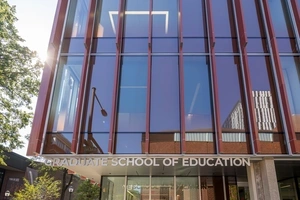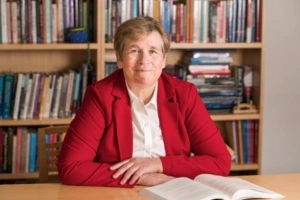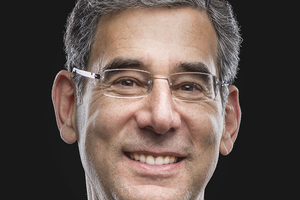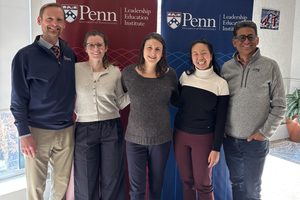In a year marked by growth and innovation, Penn GSE has experienced momentous changes, including new leadership under Dean Katharine O. Strunk, significant facilities expansion, and the launch of impactful initiatives like the McGraw Center for Educational Leadership. As a beacon of academic excellence and innovation, the School has reached new heights through its commitment to research with consequence, educational leadership, and community engagement. Here’s a glimpse into some of the top stories that have made 2023 a remarkable year for Penn GSE.

1. Katharine O. Strunk named dean of Penn’s top-ranked Graduate School of Education
Katharine O. Strunk was appointed the new dean of the University of Pennsylvania's Graduate School of Education starting July 1.
“I could not be more excited about this opportunity to work with the faculty, staff, students, and alumni of Penn’s Graduate School of Education,” said Strunk. “Penn GSE is known as a leader for its collaborative and evidence-based efforts to improve policy and practice. This approach and commitment to real-world impact has never been more important than today. I look forward to working together with our partners in Philadelphia, nationally, and around the world in service of GSE’s mission to expand educational access, especially for those underserved by society.”

2. Penn GSE showcases new space at building opening celebration
Penn GSE opened its expanded and renovated facilities, a project valued at $35.6 million, just in time for the start of classes for the 2023–24 academic year. Following a “topping off” ceremony in January to mark a major milestone in the construction, the project was brought to completion in August. A celebratory event on Oct. 25 brought together nearly 200 guests to showcase the new space.
This expansion connects two historic buildings — 3700 Walnut Street and Stiteler Hall — adding 16,200 square feet of new space and renovating another 16,900 square feet. The project's goal was to centralize Penn GSE’s degree programs and foster a unified educational environment.
“It is our response to the incredible growth we’ve experienced as a School over the last two decades and the evolving needs of our students, faculty, staff, and the wider Penn GSE community, both on campus and beyond,” said Dean Katharine Strunk.
>>View our 2023 Building Expansion photo gallery of the new building and watch a video tour of the new building shot via drone on our YouTube channel.

The McGraw Center for Educational Leadership at Penn GSE launched with an event in June, emphasizing a forward-thinking approach to educational challenges. Cheryl Logan, the center's inaugural director, highlighted its core mission: “The role of the McGraw Center is working to identify and solve big problems. I see it as a destination for creative and innovative thinkers who are comfortable with discomfort and open to collaboration.”
The event featured a keynote from Dr. James Lester, who highlighted the transformative potential of artificial intelligence in education, noting its ability to provide scalable, personalized learning experiences but also stressing the ethical considerations and the need for equitable access to such technology.

4. Culture Wars: Politicization and Polarization in the Classroom (S1E2)
Building on the success of the Educator’s Playbook, the newsletter providing practical advice for educators from Penn GSE experts, the School started an all-new Educator’s Playbook podcast, hosted by Kimberly McGlonn, a seasoned educator and Penn GSE alum. The podcast covers some of the biggest issues facing education today, like in this episode delving into the deepening ideological and cultural divides in K–12 education.
The episode features insights from Judy and Howard Berkowitz Professor in Education Jonathan Zimmerman, author of Whose America? Culture Wars in the Public Classroom. Zimmerman discusses the ideological conflicts surrounding America's historical narrative and the importance of fostering inclusive dialogue in education.
Andrea Kane, a professor of practice in education leadership and former superintendent, shares her personal experiences with equity initiatives and the challenges she faced, especially after 2020. Her story highlights the complexities and conflicts educators face in the current culturally and politically charged educational landscape.

Penn GSE received a $5 million donation from the Suzanne McGraw Foundation, focusing on early childhood education and family studies. The gift, one of the largest in School history, supports student scholarships, a new cross-disciplinary graduate concentration, and programming aimed at training educators, leaders, and policymakers in early childhood education.
“The need for more highly skilled early childhood education professionals has never been greater,” said Suzanne McGraw, educator and philanthropist. “I’m delighted to partner with Penn GSE to create an innovative curriculum in early childhood and family studies and to provide scholarships that will encourage students to enter the field.”

6. Back to School: How to encourage student attendance
Rising rates of student absenteeism and truancy have been a huge problem for schools across the country over the last several years, a troubling trend accelerated by the pandemic. Penn GSE Professor Michael Gottfried provides tips to reduce absenteeism and promote attendance in this edition of the Educator’s Playbook. He further explores the causes and consequences of absenteeism, emphasizing its significant impact on student learning and engagement in Episode 1 of the Educator’s Playbook podcast.
Gottfried's work emphasizes strategies such as enhancing school engagement, leveraging technology for communication and instructional support, and addressing logistic challenges like transportation and food insecurity.

7. Five ways teachers can integrate ChatGPT into their classrooms today
Since OpenAI launched ChatGPT late last year, bringing recent major advances in artificial intelligence (AI) mainstream and the technology’s subsequent spike in popularity, educators have been grappling with whether and how to integrate AI in the classroom. Betty Chandy, director for online learning at Catalyst @ Penn GSE, outlines five ways teachers can do just that.
Chandy emphasizes that education involves acquiring knowledge, skills, values, beliefs, and habits, focusing on the process rather than the end product. She encourages educators to consider how AI can open new avenues for teaching and learning.
Penn GSE also produced an episode of the Educator’s Playbook podcast focusing on AI and embracing new technologies. In this episode, Professor Ryan Baker explains AI's rapid evolution and its transformative impact on education, emphasizing the importance of critical engagement with AI tools in classrooms. McGraw Prize winner Chris Lehmann also shares how digital tools can enhance learning and foster critical thinking, and what it truly means to integrate new tools into schools.

8. Penn GSE professors named to Education Week's 2023 Edu-Scholar Public Influence Rankings list
Education Week announced the 2023 Edu-Scholar Public Influence Rankings, including eight University of Pennsylvania researchers, seven of whom are from Penn GSE. This annual list, compiled by Rick Hess of the American Enterprise Institute, recognizes academics who significantly influence public discussions on education.
Notable Penn GSE faculty featured include Jonathan Zimmerman (No. 14), Richard M. Ingersoll (No. 53), Howard C. Stevenson (No. 76), Pam Grossman (No. 88), Laura W. Perna (No. 90), Roberto G. Gonzales (No. 143), and Vivian L. Gadsden (No. 173). These academics have been acknowledged for their contributions to shaping public dialogue around educational issues.

9. Tips to make your classroom more welcoming for all learners
Penn GSE professor María Cioè-Peña shares six tips for educators to embrace diverse learners in a single classroom, whether they are multilingual, differ in their mobility levels, are neurodivergent, or are otherwise differently enabled.
Maria further illustrates this in Playbook podcast Episode 8, titled “Creating an Inclusive Classroom Environment for ALL Students.” She emphasizes the need to understand and address the intersections of racism, ableism, and linguicism in schools. She advocates for inclusive educational policies and practices, such as translanguaging and universal design for learning, to support diverse learners including bilingual and disabled students.
In the same episode, Kyle Schultz, a clinical psychologist specializing in the queer community, discusses strategies for making schools more inclusive for LGBTQ+ students. He highlights the importance of teachers conveying openness, using inclusive language, and creating safe spaces for queer identities.

The Penn Global Research and Engagement Grant Program awarded grants to four projects led by Penn GSE faculty, aligning with Penn’s strategic focus on global issues and interdisciplinary collaboration. Among the recipients were A. Brooks Bowden, Bodong Chen, Zachary Herrmann, and Dan Wagner, who presented their projects at the program's annual symposium at Perry World House.
The 2023 Harold W. McGraw, Jr. Prize in Education has been awarded to Dr. David Wilson, Dr. Debra Duardo, and Dr. Barbara Oakley for their transformative contributions in higher education, pre-K–12 education, and lifelong learning, respectively.
During the celebration event at the Morgan Library & Museum in New York City on Nov. 8, these awardees shared their personal stories, illustrating how their unique journeys have contributed to significant advancements in the education system.
In September, the Penn GSE community mourned the passing of Dr. Constance E. Clayton, a pioneering alum and former Philadelphia superintendent, remembered for her transformative impact on education and dedication to social justice. As the first woman and first Black superintendent of the School District of Philadelphia, she was known for her innovative approaches to education and her significant contributions to student services and teacher development. Clayton was 89.
At the 2023 commencement ceremony, Quinta Brunson, creator, executive producer, co-writer, and star of the ABC sitcom “Abbott Elementary,” stressed the crucial role of educators, calling it the “most important job in the world.” She addressed the challenges teachers face, including inadequate pay and societal pressures.
“And when it gets tough, remember: without you, there is no future, no progress, no anything,” she concluded. “Educators change the world.”
14. Dean Pam Grossman leaves a legacy of leadership
During her tenure as dean of Penn GSE starting in 2015, Pam Grossman led significant developments, including the new building expansion and navigating the challenges of the COVID-19 pandemic. Her focus on creating an inclusive and academically excellent community with a strong urban education emphasis and international impact has notably advanced the school.
Media Inquiries
Penn GSE Communications is here to help reporters connect with the education experts they need.








